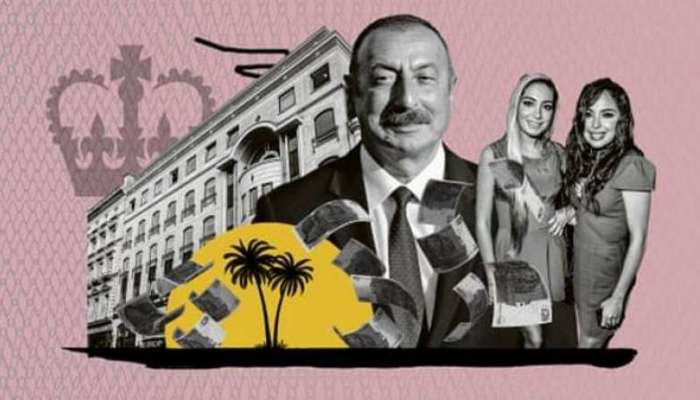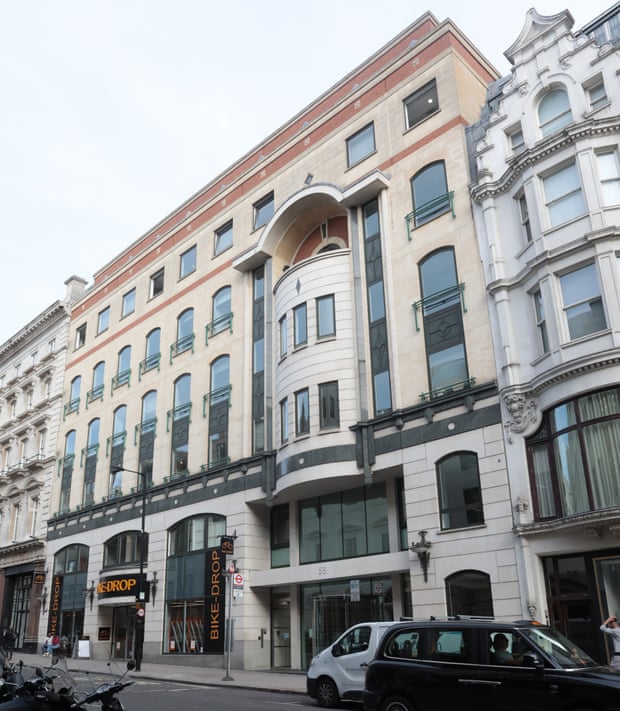Crown estate bought £67m London property from family of Azerbaijan ruler
 1441 Monday, 04 October, 2021, 00:00 The Queen’s crown estate has launched an internal review over a £67m London property it appears to have bought from Azerbaijan’s multimillionaire ruling family – which has repeatedly been accused of corruption. Details of the purchase are contained in the Pandora papers, which reveal how a network of offshore companies linked to the family and associates of the Azerbaijani president, Ilham Aliyev, has traded close to £400m of UK property over the past 15 years. The property purchases include one building acquired for £33.5m in 2009 by an offshore company beneficially owned by President Aliyev’s son, Heydar, who was then only 11 years old. The revelations raise questions about potential loopholes in the UK’s property registration system, and whether they prevent proper due diligence, even by a body such as the crown estate, nominally owned by the UK monarch and run by commissioners for the benefit of the nation’s finances. A spokesperson for the estate, which manages £15bn of property assets, said: “Before our purchase of [the building] we conducted checks including those required by UK law. At the time we did not establish any reason why the transaction should not proceed. Given the potential concerns raised, we are looking into the matter.” Aliyev has ruled Azerbaijan since succeeding his father as president in 2003 and has presided over a country that is frequently accused of human rights abuses, rigged elections and systemic corruption. In 2015, a European parliament resolution called on “EU authorities to conduct a thorough investigation into the corruption allegations against President Aliyev and members of his family”, following a series of stories by Azerbaijani investigative journalists accusing the first family of personally benefiting from state contracts and business deals. In August 2018, the crown estate paid £66.5m for 56-60 Conduit Street, an eight-storey office and retailing property in London’s Mayfair, which it bought from a British Virgin Islands-based company called Hiniz Trade & Investment. Hiniz had acquired the building for £35.5m in 2009, and the Pandora papers show how the ownership of the company was passed from the president’s daughter, Arzu Aliyeva, to her grandfather Arif Pashayev, who then placed the company into a trust in 2015. The leaked files do not show the source of the funds originally injected into Hiniz, but disclosure of the company’s shareholders – and the manner in which ownership was switched between members of Azerbaijan’s first family – raises fresh questions about whether the transaction should be investigated on money-laundering concerns. Dylan Kennedy, a former UK law enforcement officer and director of the financial due diligence company Intelpool, said: “The onward sale of any property that had originally been purchased with potentially dirty funds completes the money laundering cycle, by providing a fresh paper trail that effectively legitimises the proceeds. In this case, if the source of funds is shown to be questionable, the sale of a property to the crown estate is the pinnacle of legitimisation.” The crown estate said it had been “provided with details of the ultimate beneficial owner of Hiniz Trade and Investment Limited, but no other ownership details”. The deal is not the first time the Aliyev family’s London property investments have caused controversy. In 2018, the Solicitors Regulation Authority fined a London solicitor £45,000 for failings connected to the property investments of President Aliyev’s daughters, Leyla and Arzu Aliyeva. The tribunal found the solicitor had failed to conduct enhanced due diligence in a case that should have raised money-laundering risks. The UK government has repeatedly promised to introduce a compulsory register of overseas owners of property in the country amid concern that vast swathes of real estate are secretly held by owners who hide behind shell companies in tax havens. The Pandora papers have removed some of that invisibility, revealing for the first time how, between 2006 and 2017, the Aliyevs and associates spent £389m secretly acquiring 27 properties using a network of offshore companies. Twelve of those properties have since been sold for a combined total of £374m. Properties that the documents show the Aliyev-connected offshore companies still own include: a house in an exclusive new-build Kensington development, where homes are advertised with features including a swimming pool, Jacuzzi and a gym/cinema, and which Land Registry records state was bought for £29.3m in 2012; and three apartments in an exclusive Knightsbridge block located within metres of the department store Harrods and Hyde Park, which were acquired for about £5m in 2006. The Aliyev family did not respond to efforts to contact them.  |

Aliyev: Joint projects implemented by Azerbaijan and Iran would create broad opportunities for region
23214:18
US provided intelligence to Mexico in operation that killed cartel leader 'El Mencho': White House
25814:12
U.S. withdrawing troops from Qasrak base in Syria
22812:12
Zelenskyy says Putin already started World War Three and urges action (video)
25011:31
Sheinbaum: The situation in most of Mexico remains normal
26910:30
Tehran minister likely to meet Witkoff on Thursday, says ‘good chance’ of diplomatic solution
441Yesterday, 21:37
The Rada announced the dates of the presidential and parliamentary elections in Ukraine
78121.02.2026, 10:23
US weighs on assassination attempt on Iran's supreme leader, his son — news outlet
72121.02.2026, 10:22
